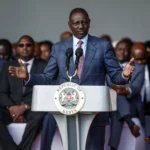Nigeria’s ban on 25 specific product categories is affecting U.S. exporters, especially in sectors such as agriculture, pharmaceuticals, beverages, and consumer goods, as stated by the United States Trade Representative on Monday.
The statement, shared on its X platform, highlighted that Nigeria’s restrictions on products including beef, pork, poultry, fruit juices, medications, and alcoholic beverages hinder U.S. market access and diminish export prospects.
“These measures create substantial trade obstacles that result in lost revenue for U.S. companies aiming to grow within the Nigerian market.”
This response from Nigeria coincides with escalating tensions regarding its extensive tariffs imposed on various nations.
- Advertisement -
Last week, the Trump administration enacted a range of tariffs from 10 percent to 65 percent on multiple countries, including a 14 percent tariff on Nigerian exports to the United States.
On Monday, Nigerian stocks experienced their most significant decline in recent times, influenced by U.S. President Donald Trump’s tariffs on global trade.
Investors faced a loss of approximately N659 billion by the end of trading, as the Nigerian Exchange’s All Share Index (ASI) fell by 1.23 percent, marking its largest single-day drop this month.
Stocks such as Oando and Honeywell Flour Mills contributed to the market downturn. Oando saw the most significant decrease, dropping from N42 to N37.80, a decline of N4.20 or 10 percent, while Honeywell fell from N11.32 to N10.19, losing N1.13 or 9.98 percent.
The Nigerian Exchange Limited (NGX) All-Share Index (ASI) and the market capitalization of equities fell from the previous day’s figures of 105,511.89 points and N66.147 trillion to 104,216.87 points and N65.488 billion, respectively. The Nigerian market’s return for the year has now decreased to +1.25 percent.
- Advertisement -
In response to the tariffs, countries like China have indicated their intention to retaliate.
On Tuesday, China pledged to “fight to the end” against the new tariffs of 50 percent threatened by U.S. President Donald Trump, further intensifying trade tensions.










